

Home, Introduction, Chapter 2, Chapter 5
The Story So Far: Like any small country town, South Bandicoot has had a long series of battles with bureaucracy at federal and state level. With no TV, a local inititive to provide a translator was approved one branch of the Federal Communications Department but then another branch of the same department confiscated it. South Bandicoot High School was closed over a sex scandal involving the headmaster, forcing students to travel 100km a day to attend Gurrangi High School. In a brief vision of progress, South Bandicoot Mayor (and owner of a local construction company) Lionel Braithwaite, and architect Basil Hume, successfully circumvented bitter local opposition to the replacement of the heritage shire offices with a mirror glass cube through a surprise 3am demolition job. But at the height of his achievement, Braithwaite went on holiday to Fiji. The following day it rained, and South Bandicoot was cut off.
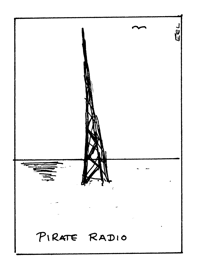
Conventional wisdom has it that Jeff Lee was responsible for the Declaration of Independence. Certainly he wrote it, with assistance from Sandra Clark and Siobhan Rafferty, but the people that caused it to be written were of a different breed and in a different place. Worthy of special mention are Dr William Mulgrave, Director of the New South Wales State Disaster Office; Cameron Perez, Chairman of the New South Wales Electricity Supply Authority; Grant Risdon, Electoral Commissioner for New South Wales; and Salome Pettifer, Commonwealth Minister for Communications, Conservation, Resources and Tourism.
In the first few days after the flood, everybody was too busy to be concerned about the lack of contact with the outside world, although to many it was a source of puzzlement. As Fiona Clark remarked to Charles Rafferty over a rare warming cup of tea:
I am beginning to feel that we are a bit like one of those little old ladies who’s been dead for a week, and who isn’t discovered until the stench becomes insupportible.
The Bandicoot Herald, in an editorial on 25th March, asked:
HAVE WE BEEN
FORGOTTEN?It is five days now since the floods began, and there are no signs that the powers that be are even aware of our situation. Certainly someone, somewhere, knows that the road is cut, but are they aware of the implications? Does anyone out there actually know that it’s our only road? And where are the intrepid pioneers from the Electricity Commission to restore our power, and Telecom to fix the telephones?
In A Goldfish Looking Out, Jeff Lee comments:
South Bandicoot is like a glass bowl. We can see the world, albeit from a distance, and hear from it. Surely, they must be able to see us? Or is our bowl a one-way mirror?
The expatriate South Bandicoot population in Sydney was indeed concerned, but to little effect, as this letter in the Daily Telegraph reveals:
TELECOM FAULT
I have been trying to contact my aging mother in South Bandicoot for over a fortnight. Telecom’s story that there is a minor fault in the exchange that will be fixed shortly is wearing thin. Has South Bandicoot been wiped out by nuclear war, a nerve-gas leak, or an Indonesian invasion? Will somebody please tell me?
Trevor Clark
Darlinghurst
A spokesperson for the Chairman of the New South Wales Electricity Supply Authority, Cameron Perez stated:
Reconnection of power in certain remote rural areas presents significant cost-benefit problems, due to pressure of work state-wide. South Bandicoot residents should be reassured that appropriate action will be undertaken as soon as possible after water levels had dropped sufficiently. In the meantime, any South Bandicoot resident suffering particular hardship is asked to telephone the ESA’s Sydney office.
The Manager of Telecom Australia’s Southern New South Wales Business Office, Simeon Pappas, stated that:
Telecom Australia has been aware of the problem regarding services connected to the South Bandicoot exchange since 23rd March, and is in process of initiating an approach to Bandicoot Shire at the earliest convenience regarding the inception of major capital works prerequisite to any restoration of service.
South Bandicoot’s first contact with the outside world was through Radio Bandicoot, which came on air on the evening of Easter Monday, April 4th. Sandra Clark set the tone of the station in her opening broadcast:
This is Radio Bandicoot, broadcasting from our Kremlin studio. Gee it’s swish in here. And warm and dry. Our Lionel sure had it good if he’d ever cracked an interview.
I’m sure you’ll be disappointed to hear that we’re not going to give you a five hour documentary on the Birth of a New Station, except that you’d better know that Elspeth Morgan and Aldo Ferrari senior are no longer on speaking terms, so there’s no point trying to ring Aldo at home. Nor have we managed to get an extended opening address from the Shire President, still soaking up the sun in Fiji. Here’s hoping for a cyclone.
So let’s get on with what we have all been waiting for-some decent music.
Later in the evening, Jeff Lee read the Bandicoot News. Half of it was a comprehensive summary of the situation in South Bandicoot, the remainder Australian and world news gleaned from the same source as the Bandicoot Herald. The local news came first. Jeff Lee explains why:
We were hoping like hell that someone out there would hear us. That someone would understand how much we were cut off, and how much we wanted someone to do something.
But we knew that in reality it was like the loudspeakers at Panmunjom, blasting propaganda into space which would not be heard, and if it was heard, would not be believed.
The results were a disappointment. ABC News the following day carried a denunciation of Radio Bandicoot by a spokesperson for the Minister of Communications, Conservation, Resources and Tourism, Salome Pettifer:
Give them an inch, and what happens? Private TV one day, pirate radio the next. Steps are being taken by the Department. The penalties in the Act are severe, and I can assure you that they will be pursued with the utmost rigour.
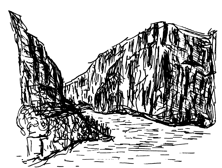
Bandicoot Gorge
A report on Radio Bandicoot also appeared in the Canberra Times Radio and TV guide a week after the station opened:
RADIO BANDICOOT
ROUSES IREThe Department of Communications’ ongoing battle with the residents of South Bandicoot has entered another phase with the appearance on the airwaves of Radio Bandicoot.
Much like Sydney’s 2JJ in style, Radio Bandicoot has rapidly acquired an enthusiastic following over much of the Southern Tablelands.
The Department’s rage comes not only from the fact that Radio Bandicoot is using both the transmitter and the frequency of the ABC’s repeater on Mt Clark, but also because the current floods mean that it can do nothing about it.
To the residents of South Bandicoot, the station makes a lot of sense. The ABC is not supplying programmes, because nobody has fixed the landline washed away by the floods, so what’s wrong with a bit of local talent.
And talent it is, too. The smoky voice of Siobhan Rafferty, the crisp commentaries of Jeff Lee, and the sheer animal blast of Sandra Clark are keeping listeners rapt. Rumour has it that there’s already a Siobhan Rafferty fan club in nearby Gurranji.
So if it’s a choice between the River Heights and Radio Bandicoot, long may the landline stay down.
The broadcasts from Radio Bandicoot led one newspaper to investigate. As a correspondent from the Australian’s Weekend Magazine reported:
The residents of South Bandicoot are wondering whether they are really part of Australia. For all the links that they have, they may well be right.
It took us three days to get there.
There is only one road, with potholes the size of Lake Eyre, and where it reaches One Mile Creek, on the "border" of South Bandicoot, it vanishes into a swirling torrent of brown water.
There used to be a bridge there, I am told — a ricketty wooden bridge that was put up last century, and had seen better days. "Bluey" Clark, a minor local celebrity, showed me the remains of one of the trusses wedged into a sandbank at the junction with Bandicoot Creek, five kilometres downstream.
The four-wheel drive tracks stop in seas of mud and surging creeks.
We thought of walking, following the high ground, but the dense bush and the deep valleys dissuaded us.
Eventually we returned to Sydney and hired a helicopter.
When we landed, it was like the pictures you see of the first white explorer in some remote New Guinea valley. The natives were cautious at first, and hid their disappointment that we had no gifts of toothpaste, razor blades and coca-cola behind generous offerings of home-brewed beer. The kids gathered around, pulling at our clothes and cameras, to see if we were real.
We were the first outsiders to come to South Bandicoot in nearly a month.
In an editorial, the Sydney Morning Herald asked why South Bandicoot had received no emergency relief, and whether any other places were equally affected. The reply, in a letter from the Director of the State Disaster Organisation, Dr William Mulgrave, denied that the State Disaster Organisation had failed to respond:
It is pernicious nonsense to claim that South Bandicoot has been neglected by the State Disaster Organisation.
At no time has any request for assistance been received.
There have at all times been adequate supplies and equipment in South Bandicoot, and in the circumstances it is ridiculous to suggest that the resources of the State Distaster Organisation should have been diverted to attend to a non-existent problem.
We are appreciative of the efforts of Radio Bandicoot in reassuring us in this regard.
The Sydney Morning Herald, unable to afford a helicopter, visited the State Disaster Organisation’s control room on a fact-finding mission:
FORGOTTEN VALLEY
Monumental Cover-up
in SDO DisasterThe Control Room of the State Disaster Organisation is crowded, frenetic, a hive of activity. Phones ring, telexes chatter, grown men swear, cry and huddle in scrums over urns of black coffee.
One wall of the control room consists of an enormous map of New South Wales, studded with pins, stickers and magnetic clips. A green grasshopper signifies a locust plague at Menindee, paddle-steamers signify floods at Dubbo, Moree and Windsor, a black-headed pin a desperate search for trapped coal-miners at Maitland, a dragon from a corn-flakes packet a lost girl in Kangaroo Valley. Aeroplanes, helicopters, trucks and men with spades signify relief teams; minature tins of baked beans mark food drops.
But against that same wall is a filing cabinet, obscuring one small corner of the state ...
In that afternoon’s Sun, the SDO replied:
Dr William Mulgrave, Director of the State Disaster Organisation, denied that there had been a cover-up on the lack of relief operations to South Bandicoot.
Variations in colouration between different panels on our control-room map is a manufacturing fault of no significance, and has no impact on relief operations," he said.
The New South Wales Minister of Corrective Services and Catastrophes, Wal Wojtlya, said in a radio interview rebroadcast on Radio Bandicoot:
The flood relief programme is going swimmingly. All areas of genuine need have been properly addressed. If you want to retail the scuttlebut of a pack of rural whingers up to their usual games, you’re welcome, but don’t expect us to bust a gut pumping their pig farms dry.
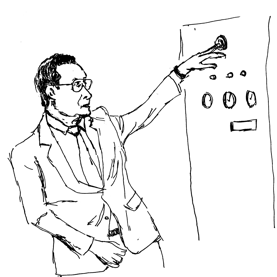
Aldo Ferrari turning on the power
On April 7th, the first stage of the new power station was opened: a water wheel suspended from a massive tree overhanging Bandicoot Gorge. Charles Rafferty commented that:
It was worthy of Heath-Robinson at his best.
Aldo Ferrari described it as:
s ...... a temporary expedient, with a potentially limited operating lifetime, but adequate in that it provided several hundred kilowatt
The opening was reported by Radio Bandicoot, and received an immediate response from the Chairman of the State Electricity Supply Board, Cameron Perez, again via the ABC News:
... the actions of residents of Bandicoot Shire in the unilateral restoration of local electricity supplies can only be regarded as criminally irresponsible, and a danger to all concerned. Appropriate action will be taken against the culprits as soon as practicable ...
The Gurranji Advocate reported:
Two unidentified bodies wearing SESB overalls were washed up at the junction of Bandicoot Creek and One Mile Creek yesterday morning.
The SESB denies any knowledge of the men, but usually reliable sources suggest that they were on a secret mission to dismantle the new South Bandicoot power station, regarded by the authority as a threat to its revenues.
The Daily Mirror reported:
Bandicoot Shire Engineer Aldo Ferrari is quaking in his shoes and hoping the water doesn’t go down too soon after the State Electricity Supply Board took out a warrant for his arrest on the grounds of illegal generation of electricity.
Ferrari faces a $10,000 fine and up to five years in jail if the charges are proven.
Another seed for the revolution had been planted over a year before by the Australian Electoral Office, with the decision that South Bandicoot did not warrant a polling booth. The Sydney Morning Herald reported the story at the time:
VOTES MEAN DOLLARS IN
ELECTORAL RESHUFFLEThe Australian Electoral Office is to make drastic cuts in the number of polling booths in an attempt to reduce the horrendous cost of conducting elections.
A polling booth such as Birdsville costs thousands of dollars to run, but only brings in 70 votes. "This is obviously uneconomic," a spokesman for the office pointed out.
Small polling booths would be amalgamated with nearby booths to give one large booth. In remote areas, postal voting would be available.
The Federal Election of 1983 was held on "national" issues, far from the borders of South Bandicoot, the poll only a few days before the flood. There was anger at the requirement to drive 50 kilometres to vote, and more anger when, three days after the declaration of the poll, a major party candidate was declared ineligible:
New Zealander Jonathan Blunt has never taken out Australian citizenship, and has convictions for fraud, grievous bodily harm, and sheep stealing.
The darling of the New South Wales party machine, Blunt was preselected over the head of a number of well regarded local residents.
The by-election, scheduled for April 30th, yielded a football team of candidates. At first, the Bandicoot Herald and Radio Bandicoot gave a day by day account of the campaign, but as time went on, their enthusiasm waned. The Socialist Worker candidate scheduled a visit to South Bandicoot, but it rained, and the creek rose again.
Fiona Clark summed up the problem in a letter to the Bandicoot Herald (27/4/83):
I have been told that an election is to be held this coming Saturday.
As we well know, the Electoral Office has abolished the South Bandicoot polling booth as an economy measure. "Postal votes will be available," they told us. Where? And How?
In the old days, maybe, the mails always got through (although I have my doubts), but a more appropriate saying now would seem to be "You can take a Pony Express to water, but you can’t make it cross."
Perhaps the electoral office could spread its wings a little, and fly us in some ballot papers.
The letter was read on Radio Bandicoot and received a response in the form of an interview with the Electoral Commissioner for New South Wales, Grant Risdon, on a Canberra breakfast programme:
It is a ridiculous request. We would have to take a helicopter from house to house. It would take days, and cost the earth. And for what result? The numbers in a place like that are never enough to affect the result....
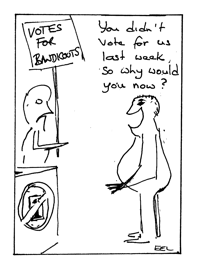
An angry editorial in the Bandicoot Herald remarked:
The Australian Electoral Commission leads the world in its new concept of Optional Democracy, otherwise known as giving the vote only to those people whose votes are thought to make a difference to the result. By the next election, may we look forward to polls only in the marginal seats, and a simple run-off for the last senate place in each state?
It is our right, as citizens of a democracy, to vote. If we are denied that vote, are we really citizens?
Risdon’s reply to this was:
I don’t see what they’re beefing about. We won’t fine them.
In a tongue-in-cheek article in Saturday morning’s Bandicoot Herald, Jeff Lee suggested that the only honourable solution to the problem was secession:
It is pretty clear that Australia doesn’t want us because we’re too expensive. Perhaps we should settle for a footbridge, one vote between us, and a man on a hilltop semaphoring messages, as the price of rejoining the lucky country. Or perhaps we should go our own way.
The problem then, is what do we call ourselves? Are we South Bandicoot, or just Bandicoot, or Bandicoot Valley, or maybe Moa Bandicoot, or Thylacine Mansions? It is a little worrying sometimes, that two of our three main placenames are extinct.
And what sort of country are we? We can’t be a kingdom, because King Lionel has been deposed in absentia. We can’t be a United States, because neither Moa Mansions nor Thylacine have yet tried to secede. So I suppose that that makes us a Republic.
What sort of Republic? Federal Republic won’t work for the same reason as United States. A Democratic Republic? That doesn’t seem right, because we are fleeing from Democracy Australian Style. Socialist Republic is wrong too, because all we are doing is helping each other.
What about People’s Republic? It brings images of gerontocracy and the creaking of a Party Machine, and with all respect to Dr Rafferty and to the Railway Hotel Reading Circle, we are neither of those.
But then neither are China or Albania or Mongolia people’s republics in any real sense. And we are.
So here’s to the People’s Republic of South Bandicoot.
In his memoirs, Charles Rafferty describes how Lee’s idea took off:
There are some things that you should never say, such as referring to your sister-in-law as a supercilious bitch who would nag a labour caucus into privatising Parliament House, even if you mean them, because they are likely to get away from you.
During the afternoon, Lee’s article grew from a giggle, through a game in which Elspeth Morgan was cast as Margaret Thatcher and James Spence became Lord High Executioner, to a manifesto for revolution.
By the evening, the whole town was in on the action. The Railway’s always a bit of a scrum on Saturday night, but this was grand final night, and vicious, too, except the opposition hid at the other end of the field where we couldn’t get at them.
There were still some voices in the wilderness. Fiona Clark argued for caution. "What happens when the creek drops?" she asked. Aldo Ferrari objected on principle. It was one thing to get on with the job in the absence of Authority, he argued, but it was another to openly defy them. "Bozo" Rafferty was worried about whether he’d have to paint his van mission brown.
Sandra Clark favoured instant rearmament and an invasion of Australia. Jeff Lee was advocating a barrage of revolutionary rhetoric that would make them kick us out from sheer exasperation.
Siobhan Rafferty summed up. "What the hell. Why not?" Sober words to herald the start of a revolution.
"Bluey" Clark was despatched to Radio Bandicoot with an ultimatim to the Australian Government:
We’re not real experienced at sending ultimatims, except when some bludger’s dragging the chain about buying his round. But I suppose that’s what this is about then, really, isn’t it? It’s you bludgers dragging the chain about our democratic rights — you know, voting, and all that.
So, whoever’s out there listening, tell the pollies, will you, that we’re real fed up, and that they’ve got till 10 o’clock tomorrow morning to fly us in voting papers for today’s elections, and they’ve got to make sure we all get them, and that they’re counted, along with all the others. Mind you, the way we’re feeling, we’ll probably vote informal anyway, but that’s not the point.
If they don’t fly us those papers in, we reckon that what the Australian Government’s saying is that the People of South Bandicoot aren’t really part of Australia at all, so tell them that, and tell them that we’ll take them at their word and we’ll declare ourselves independent.
There was no response, except for a reported interview with the Chief Electoral Officer for New South Wales, Grant Risdon, in which he said:
Don’t be stupid. The polls have closed, and that is that.
A Mass Meeting of the People was held the following lunchtime at the Railway Hotel. The crowd overflowed onto the verandah and into the street. "Bozo" Rafferty gave a short speech, and the Declaration of Independence was passed around for everybody to sign. As Charles Rafferty remarks:
Such was the intensity of feeling that not one D. Duck, M. Mouse or L. Braithwaite affixed his signature to the declaration, because to do so would have resulted in certain lynching.
Arnold Hume was permitted a "You are being very silly ..." before being booed from the scene.
At 5 p.m. on 1st May, Radio Bandicoot broadcast the Declaration of Independence. A special edition of the Bandicoot Herald, officially renamed The People’s Daily, celebrated the occasion. At the Railway Hotel, drinks were free for the rest of the evening.
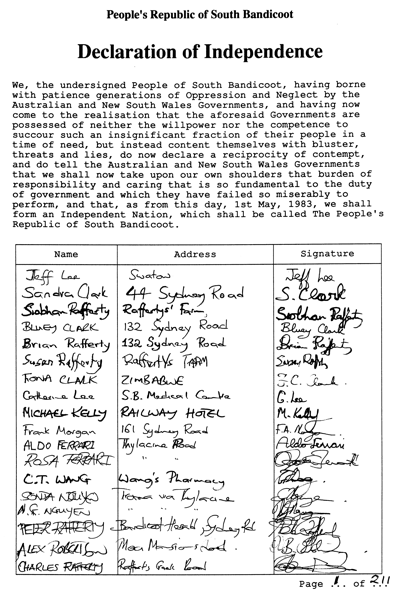
The first page of the Declaration of Independence
Copyright © D.W. Walker, 1991